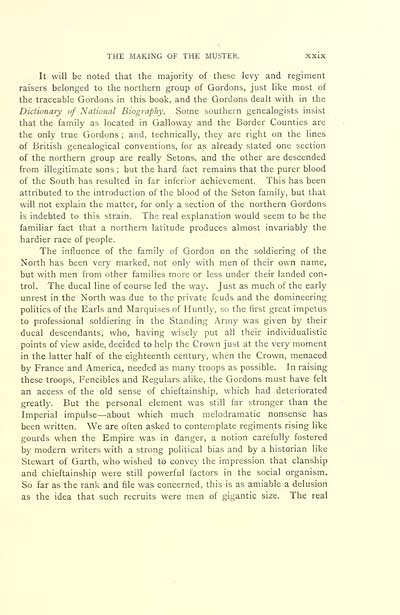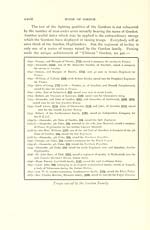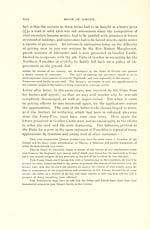New Spalding Club > House of Gordon > Gordons under arms
(39) Page xxix
Download files
Complete book:
Individual page:
Thumbnail gallery: Grid view | List view

THE MAKING OF THE MUSTER. XXlX
It will be noted that the majority of these levy and regiment
raisers belonged to the northern group of Gordons, just like most of
the traceable Gordons in this book, and the Gordons dealt with in the
Dictionary of National Biography. Some southern genealogists insist
that the family as located in Galloway and the Border Counties are
the only true Gordons ; and, technically, they are right on the lines
of British genealogical conventions, for as already stated one section
of the northern group are really Setons, and the other are descended
from illegitimate sons ; but the hard fact remains that the purer blood
of the South has resulted in far inferior achievement. This has been
attributed to the introduction of the blood of the Seton family, but that
will not explain the matter, for only a section of the northern Gordons
is indebted to this strain. The real explanation would seem to be the
familiar fact that a northern latitude produces almost invariably the
hardier race of people.
The influence of the family of Gordon on the soldiering of the
North has been very marked, not onl}' with men of their own name,
but with men from other families more or less under their landed con-
trol. The ducal line of course led the way. Just as much of the early
unrest in the North was due to the private feuds and the domineering
politics of the Earls and Marquises of Huntly, so the first great impetus
to professional soldiering in the Standing Army was given by their
ducal descendants, who, having wisely put all their individualistic
points of view aside, decided to help the Crown just at the very moment
in the latter half of the eighteenth century, when the Crown, menaced
by France and America, needed as many troops as possible. In raising
these troops, Fencibles and Regulars alike, the Gordons must have felt
an access of the old sense of chieftainship, which had deteriorated
greatly. But the personal element was still far stronger than the
Imperial impulse— about which much melodramatic nonsense has
been written. We are often asked to contemplate regiments rising like
gourds when the Empire was in danger, a notion carefully fostered
by modern writers with a strong political bias and by a historian like
Stewart of Garth, who wished to convey the impression that clanship
and chieftainship were still powerful factors in the social organism.
So far as the rank and file was concerned, this is as amiable a delusion
as the idea that such recruits were men of gigantic size. The real
It will be noted that the majority of these levy and regiment
raisers belonged to the northern group of Gordons, just like most of
the traceable Gordons in this book, and the Gordons dealt with in the
Dictionary of National Biography. Some southern genealogists insist
that the family as located in Galloway and the Border Counties are
the only true Gordons ; and, technically, they are right on the lines
of British genealogical conventions, for as already stated one section
of the northern group are really Setons, and the other are descended
from illegitimate sons ; but the hard fact remains that the purer blood
of the South has resulted in far inferior achievement. This has been
attributed to the introduction of the blood of the Seton family, but that
will not explain the matter, for only a section of the northern Gordons
is indebted to this strain. The real explanation would seem to be the
familiar fact that a northern latitude produces almost invariably the
hardier race of people.
The influence of the family of Gordon on the soldiering of the
North has been very marked, not onl}' with men of their own name,
but with men from other families more or less under their landed con-
trol. The ducal line of course led the way. Just as much of the early
unrest in the North was due to the private feuds and the domineering
politics of the Earls and Marquises of Huntly, so the first great impetus
to professional soldiering in the Standing Army was given by their
ducal descendants, who, having wisely put all their individualistic
points of view aside, decided to help the Crown just at the very moment
in the latter half of the eighteenth century, when the Crown, menaced
by France and America, needed as many troops as possible. In raising
these troops, Fencibles and Regulars alike, the Gordons must have felt
an access of the old sense of chieftainship, which had deteriorated
greatly. But the personal element was still far stronger than the
Imperial impulse— about which much melodramatic nonsense has
been written. We are often asked to contemplate regiments rising like
gourds when the Empire was in danger, a notion carefully fostered
by modern writers with a strong political bias and by a historian like
Stewart of Garth, who wished to convey the impression that clanship
and chieftainship were still powerful factors in the social organism.
So far as the rank and file was concerned, this is as amiable a delusion
as the idea that such recruits were men of gigantic size. The real
Set display mode to: Large image | Transcription
Images and transcriptions on this page, including medium image downloads, may be used under the Creative Commons Attribution 4.0 International Licence unless otherwise stated. ![]()
| Publications by Scottish clubs > New Spalding Club > House of Gordon > Gordons under arms > (39) Page xxix |
|---|
| Permanent URL | https://digital.nls.uk/79781165 |
|---|
| Description | Volumes 47-53 are uniform with but not part of the club's series. |
|---|---|

